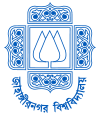
Fazlul Halim Rana Associate Professor, Department of International Relations
PROFILE
SHORT BIOGRAPHY
Md. Fazlul Halim known as Fazlul Halim Rana is a Bangladeshi writer, political analyst, researcher and social activist. He has been working in the Department of International Relations at Jahangirnagar University since 2016. He has been serving as the Chair of the same department since August 2019. Prior to joining the university as a faculty, Mr. Fazlul worked as a Political Expert Assistant in the European Union of Bangladesh.
He has also been working as Project Director and Researcher in various important research projects of the Ministry of Education, Ministry of Environment, Forests and Climate Change, Government of the People's Republic of Bangladesh. He has been contributing as a consultant to the Climate Change Trust Fund of the Government of Bangladesh.
Mr. Fazlul graduated in Political Science from Dhaka University and obtained his Master's degree from the same department. He received another MA degree in Politics and Mass Media from the Department of Communication and Media in 2015 from the University of Liverpool, England.
RESEARCH INTEREST
Social Media and it's Impact on Contemporary Society; Relationship between Gender, Media and Politics; and International Affairs of Latin America.
JOURNAL PAPER
• Halim, Fazlul , Humantarian Intervention: Finding out Its Human Security Implications, Bangladesh Institute of International and Strategic Studies BIISS, Vol. 35 , No.4 , 2014.Abstract:
Humanitarian intervention based on the idea called ‘The Responsibility to Protect (R2P)’ leaves little room for controversy because such intervention is meant to save populations from genocide, war crimes, ethnic cleansing and crimes against humanity. In effect, the R2P is a step by step process for dealing with an internal conflict with significant security implications. It is a composite whole of three elements and each of which tries to deal with an internal conflict with due consideration to security at three levels, i.e., human security at the national level, regional security and international security. In view of the fact that contemporary world witnesses, till to date, many internal conflicts of various nature, intervention in such cases, henceforth, should be guided by the spirit of R2P. This would enable the conflicts to find their respective end in a peaceful and non-violent manner in consonance with international laws and norms. The paper attempts to study the various elements of R2P from a comprehensive security perspective with recommendation for its application in all future internal conflicts including the current one in Syria.
• Halim, Fazlul , The European convention on human rights and fundamental freedoms: The protection of individual rights in the age of globalization, Bangladesh Journal of Law, Vol. 11, No. 1&2 , 2011.
Abstract:
The European Convention on Human Rights and Fundamental Freedoms is considered as the premier document, which offers the highest degree of protection of individual rights. Since 1953, the Convention has been playing an important role to understand the issues of individual human rights. By contrast, the developments of globalisation have added a number of challenges in the context of individual rights. However, the development of the concept of individual human rights in Europe has taken a long process of evolution. Therefore, the objectives of this paper are to evaluate the evolving process of individual rights in Europe, and to examine how far the European Convention on Human Rights and Fundamental Freedoms is addressing the emerging realities of globalisation.
• Halim, Fazlul, Relationship between Democracy and Journalism: Examining the Extent of Support or Non-Support to Democratic Process by Contemporary Journalism, Journal of International Relations, Jahangirnagar University, Vol. VII, No. 08 , 2018.
Abstract:
Democracy and journalism are interconnected with each other. A food functioning journalism is considered as a prelude to flourishing of democracy in any given polity. The paper attempts to bring out the essential attributes of good journalism that help make democracy more effective and functional in contemporary world. In effect, a great section of the paper deals with the role of journalism, whether positive or negative, in upholding democracy in modern age. The paper then examines the present state of journalism in Bangladesh—a country which is still in a transitional phase in its democratic practice.
• Halim, Fazlul, Women’s Political Empowerment in Bangladesh: An Analysis of Parliamentary Quota System, The Jahangirnagar Review, Part-C, Vol. XXVIII , 2017.
Abstract:
Bangladesh practiced parliamentary democracy from its foundation. It introduced a quota system from the first parliament to ensure women’s participation in politics. The present parliament of Bangladesh has 50 (16.66 percent) reserved seats for women, allocated to the political parties in proportion to their vote share. Beyond the quota system, women are free to participate in politics normally as well, and there are currently two prominent women leaders. Nevertheless, it has been claimed that women’s participation in politics remains extremely limited in Bangladesh and that the quota system may hinder rather than support women’s participation on equal terms. This study will analyse the consequences of the quota system for women’s participation in politics in Bangladesh, examine whether it is a help or a hindrance and evaluate its strengths and weaknesses. The findings and discussion of the study show that the quota system is quite helpful for women empowerment in Bangladesh, despite the fact that it needs reformation. The present study recommends necessary reformation not only for the parliamentary quota but also for making women quota within the political party portfolio a guaranteed phenomenon. In addition, this study serves as a food for thought for future research on the subject.
• Halim, Fazlul, Empowering Political Protest Through Social Media: A Reality or an Illusion, Journal of International Relations, Jahangirnagar University, Vol. VII, No.7 , 2016.
Abstract:
Social media used for sharing similar social needs values and beliefs. However, the purpose of social media goes beyond it, in particular when its use is meant for political purposes as well as amply demonstrated by the Arab spring events, social media acted as a powerful instrument for conveying political viewpoints and massages among the people all with the avowed intention of changing long drawn tyrannical and autocratic rules. The paper purports to study this political dimension of social media in many of its facts. To substantiate the argument the case of Egyjpt has been taken as a case study in the paper. In view of the fact that social media is a complicated invention of modern information technology, the paper also deals with the formation of social media and its various supporting networks. The paper does not leave any advisory lesson for any country to0 use social media for political purposes, except to point out that if needed, the people can masse will not hesitated to use social media for political purposes as well.
• Halim, Fazlul, The Immigration Issue in the Uk General Election: A Security Analysis, The Jahangirnagar Review, Part-C, Vol. XXVII , 2016.
Abstract:
The UK has been a host to a number of immigrants from across the world over the last century and a half. The reasons for this are not far to seek. As the greatest colonial power, the country had to absorb people of different types at different points of time. A number of people settled in the kingdom in search of a better standard of life with security. Thanks to the neo-liberal policy of the UK, the immigrants could live well in the kingdom until 9/11. After 9/11 security concern vis-à-vis the immigrants became a big political issue in England. Slowly, the immigration issue became an agenda in the election process of the country. There is no denying the fact that the 2015 election had been much influenced by the debate and controversy over the immigration issue. The paper studies this phenomenon in many of its facets. Of interest is the varying role played by the media over the immigration issue in line with their respective belief and ideology. The paper suggests that it is essential to arrange a rational reformation of immigrant law.
Teaching
| Course Code | Course Title | Semester/Year |
|---|---|---|
| IR 408 | International Affairs of Latin America | 4th |
| IR 203 | Media and Mass Communication | 2nd |
| IR 103 | Political Organization and the Constitutions of Bangladesh, USA, UK and India | 1st |
Academic Info
Master of Arts ( M. A) in Politics and the Mass Media
Master of Social Science (M. A) in Political Science
Bachelor of Social Science (B. S. S) in Political Science
Higher Secondary Certificate (H. S. C) in Arts
Secondary School Certificaten (S. S. C) in Arts
Experience
Position: Faculty
Period: July 14, 2016 - Present
Terms of Reference as an Associate Professor:
1. Media and Mass Communication
2. Social Media and the cotemporary world politics
3. International Affairs of Latin America
4. Political Organization and the Constitutions of Bangladesh, USA, UK and India
In addition teaching of courses on International Relations in line with the syllabus approved by the Academic Council; Conduct research, publish articles in academic/professional journals and/or participate in associations to maintain a professional profile in the field.
Position: Project Director
Period: June 2019 - May 2020
The project aims to study the causes of human displacement from the coastal zone to the neighboring areas in Bangladesh. It also aims to outline a capacity building framework for the victims.
Position: Political Analyst Assistant
Period: November 11, 2013 - January 7, 2014
Terms of Reference as Political Analyst Assistant:
1. Provide research support on the subjects pertaining to security, economic and bilateral interests between Bangladesh and the European Union.
2. Responsible for policy engagement with government institutions, international development partners, think tanks, and the Third Sector on the issues of security and political affairs.
3. Review all incoming research proposals in the EU’s program area, program review meetings, and proposals on related subjects that fall under EU’s mandates.
4. Monitor new technical information, policy developments, issues, and trends related to national interest and recommend programmatic responses.
Activity
Position: Associate Professor and Chair
Period: July 14, 2009 - Present
Mr. Fazlul Halim Rana teaches and researches as well as writes regularly on social media and print media. The various inconsistencies between society and the state and the analysis of contemporary international politics are the main themes of his writing. Besides, he has a long reputation as a debater in the debate arena of Bangladesh. He is also involved as an advisor to the university's Debate Organization.
Mr. Fazlul is leading a social awareness movement in Bangladesh. He has started a program of providing free books to make the backward people of the society interested in reading books. He is distributing 50 books free of cost to interested people in different parts of the country every month through his charity organization.
He is also a regular participant in various international seminars, symposiums and conferences.
Contact
Fazlul Halim Rana
Associate Professor
Department of International Relations
Jahangirnagar University, Savar, Dhaka-1342, Bangladesh.
Cell Phone: 01819020666
Work Phone: 7791045-51; Ext.: 1378
Email: fazlul@juniv.edu
, fhrana_ju@yahoo.com

